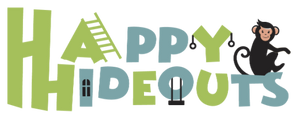Why Are Monkey Bars Called Monkey Bars? A Cheeky History
Ever wondered why we're all pretending to be primates in the garden? Let's dive into the wonderfully weird world of the history of monkey bars - it's more interesting than that documentary you fell asleep to last night.

What Are Monkey Bars Called in Different Countries?
It turns out swinging around like our primate cousins is a pretty universal human experience. The names we give these playground favourites tell us something rather charming about how different cultures view this peculiar pastime.
In Britain and Australia, we keep things delightfully literal with "monkey bars" - because let's be honest, we all look a bit simian when we're dangling up there. The Americans actually lean more towards "jungle gym" for their climbing frames, which feels rather appropriate given all the monkeying around that happens on them.
The French, ever elegant, call them "barre de singe" - which manages to make "monkey bars" sound like something you'd find in a sophisticated Parisian playground. Meanwhile, Spanish-speaking countries use "barras de mono," proving that sometimes the simplest translation is the best one.
Browse our collection of outdoor play equipment from internationally recognised brands

What Are Monkey Bars Called in Spanish?
While "barras de mono" is the standard Spanish term, what's fascinating is how playground equipment brings out similar childhood experiences across Spanish-speaking cultures. From Madrid to Mexico City, you'll find children swinging and climbing, all understanding exactly what these simple metal bars are for, regardless of what they call them.
Some regions have their own playful variations too - much like how Americans distinguish between their jungle gyms and monkey bars (with jungle gyms being more of a climbing frame network, while monkey bars are specifically the overhead bars you swing across).

Who Invented Monkey Bars?
Like many brilliant ideas that seem obvious now (think sliced bread), monkey bars have a rather fascinating origin story. Those proper Victorian exercise enthusiasts, always eager to work up a sweat in their three-piece suits, played a significant role in developing early outdoor fitness equipment. But it wasn't until the early playground pioneers got involved that things really started swinging. [Read more: Victorian Exercise Equipment That Inspired Modern Playgrounds]
The evolution reads like a "what not to do" guide in playground design. Early versions were essentially metal poles stuck in the ground - health and safety wasn't exactly top priority back then. Some bright spark tried wooden versions (spoiler alert: not the best plan when British weather gets involved). Finally, modern materials came along and transformed these playground staples into the safer, more durable versions we see today.
Here's a brilliant bit of trivia for your next garden gathering: monkey bars were actually first designed for military training. Imagine soldiers in full gear traversing these metal bars - quite different from little Tommy showing off his latest playground moves! They found their way into schools during the 1920s, when someone brilliantly realised that children might enjoy pretending to be monkeys more than soldiers would.
The British playground evolution has been particularly interesting, progressing from basic metal frames that made you wonder if tetanus shots were up to date, through various (much needed) safety improvements, to today's multi-use designs that would make those Victorian exercise enthusiasts' moustaches curl with envy.
Discover our collection of modern playground innovations
Modern monkey bars have survived numerous playground safety reforms, which is quite impressive when you think about it. They've even experienced something of a fitness revival lately, with adults rediscovering their inner chimp in garden workouts. Though watching Dad try to recreate his playground glory days might require keeping the first aid kit handy!
Want free advice from our friendly team? Give us a call on 01249 588853
Browse our complete monkey bar collection
We're here to help you choose the perfect setup. Give us a bell at 01249 588853 – we're always chuffed to help fellow monkey bar enthusiasts find their perfect match!
Have you checked out our other posts?



Leave a comment